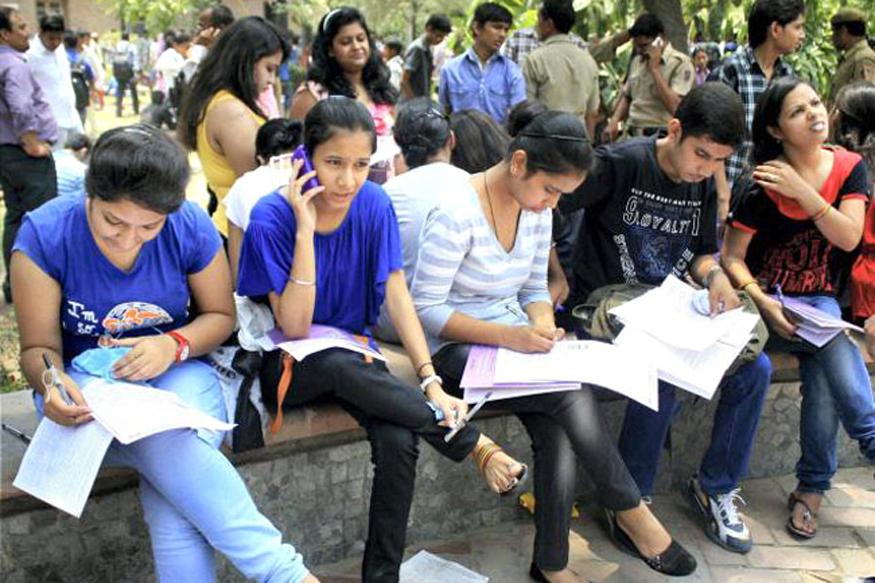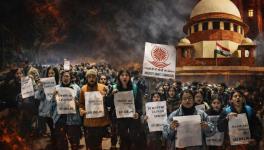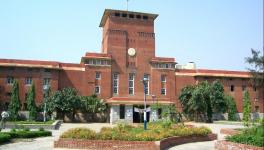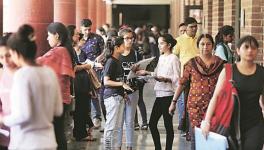More Fees, Less Scholarships—thanks to National Education Policy

Representational Image. Image Courtesy: PTI
When a student delegation of South Asian University (SAU) met its acting vice-president to revoke the expulsion of five students who had demanded more stipends for masters courses and scholarships for the economically marginalised, he shot back, “More heads will roll.”
SAU students have been protesting for more than a month demanding more stipends and scholarships, parity of PhD stipends with JRF, the inclusion of students in complaints and grievance redressal committees and more social science faculty members in these panels and on administrative positions.
On November 3, the then-proctor was asked to initiate police action against the protesting students but he resigned in solidarity with them. The new proctor expelled two students, rusticated another two for a year and suspended one for a semester the next day.
Umesh Joshi, a PhD sociology student who was expelled, said, “No procedure was followed; the proctor just sent a notice saying we are expelled without mentioning the complaint against us.”
On November 5, the students started a mass hunger strike. “On Monday, eight students started an indefinite hunger strike. Our blood sugar levels have massively dropped. The university administration is apathetic to our issues and not even willing to talk to us,” added Joshi, who is part of the indefinite hunger strike.
As of November 14, three students had critical sugar levels and one was in critical condition after almost suffering cardiac arrest.
What is happening at SAU is part of a trend of government university students paying increasing fees with scholarships being withdrawn in the last two years—thanks to the National Education Policy (NEP), 2020.
The NEP has replaced the system of Central grants to universities via the University Grants Commissions (UGC) with a centralised funding body called the Higher Education Funding Authority (HEFA) which will grant loans to public universities. The institutes have been accorded so-called “financial autonomy” wherein they are left to fend for themselves with the burden of loans invariably falling on students.
Students of Indian Institute Of Technology Delhi and Bombay, Banaras Hindu University (BHU), Delhi School Of Journalism and Allahabad University, among others have been protesting fees hikes and shrinking scholarships.
Allahabad University was one of the most affordable universities with an undergraduate fees of Rs 975 per annum, which has increased by 400% to Rs 4,151 a year. Only 10% of Indians earn more than Rs 25,000 per month.
Devendra Azad, who is pursuing masters in political science at Allahabad University and part of the months-long protests, said that the university administration has completely ignored students on hunger strike. “The indefinite hunger strike continued for six days but the administration did not even bother to talk to us. On the seventh day, the proctor flatly rejected our demands. The students were kicked and the police are always present in the university,” he said.
The NEP is being rolled out and its effects are already being felt. “As soon as you switch from publicly funded education, the fees structure would obviously get affected,” explained Rohit Azad, an economics professor at Jawaharlal Nehru University.
“The university takes a loan to start a programme but has to generate funds to pay it with interest. How will the funds be generated? Of course, from the fees of students, who would have to pay both for the loan and salaries of professors,” Azad further explained.
“This will be exclusionary like at any private university.” At private universities, the composition is “skewed in favour of the elite and the upper-middle class, not poor students. Those who need education the most are going to find it increasingly difficult to enter the university system”, Azad added.
The educational system does need reforms, but the “NEP does the opposite”, Azad alleged. “We keep talking about youth dividends but if you don’t have enough educational institutions to cater for that population, it will never give returns. The NEP is even more exclusionary in favour of the rich and the upper-middle class.”
The NEP will also impact the accountability and quality of research, according to Azad, as many academics and researchers will have to look at different sources of funding such as loans and corporate social responsibility programmes.
“The dependence on funds affects research. If you are getting funded by a corporate entity, the kind of research that you do will obviously be dictated by their interests. At a publicly funded university, the accountability is towards the public and not towards any individual or corporation. That’s why research flourishes much more at publicly funded universities,” Azad said.
Many students feel that resistance is the only way to counter the NEP. Shambhavi Sharma, a member of the student organisation Collective and a PhD student at IIT Delhi, gives the example of the IITs in Delhi and Bombay. “Fees of IIT Bombay and Delhi were massively hiked this year. The fees was partially rolled back only after a prolonged student protest,” she said calling for more resistance as the “frequency of fees hikes will increase”.
The sudden changes in the education system are based on the Birla-Ambani Report, which recommended fees hike and raising funds from internal accruals, according to critics and observers. Public education was formulated to provide affordable education to the masses. The NEP turns the student into a resource from which funding will be extracted and public education moves from being a social good to a corporatised enterprise with the government washing its hands of all responsibility.
The writer is a student of convergent journalism at AJK Mass Communication Research Centre, Jamia Millia Islamia.
Get the latest reports & analysis with people's perspective on Protests, movements & deep analytical videos, discussions of the current affairs in your Telegram app. Subscribe to NewsClick's Telegram channel & get Real-Time updates on stories, as they get published on our website.























